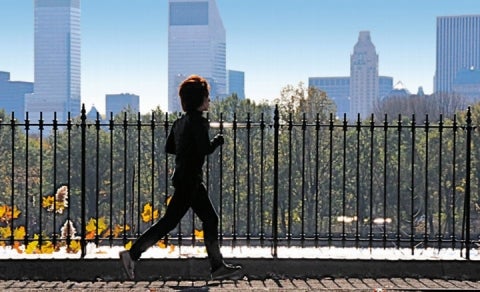Note: Yale School of the Environment (YSE) was formerly known as the Yale School of Forestry & Environmental Studies (F&ES). News articles and events posted prior to July 1, 2020 refer to the School's name at that time.

More than half of the world’s population now lives in cities compared with 34 percent in the early 1960s. By mid-century, it will reach about 70 percent. This trend has profound health implications for the people living in these urban areas, from the quality of the air they breathe to their opportunities for physical activity.
Next month, the F&ES-based Hixon Center for Urban Ecology and the Yale School of Public Health will host a two-day conference, “Urban Nature as a Health Resource,” to explore how improved access to natural areas in urban areas can enhance public health.
The conference will be held Feb. 5 to 6 at Kroon Hall, 195 Prospect Street in New Haven. Click to register
The event will provide an opportunity for researchers and practitioners to share research on the link between nature and health and to learn from innovative programs that improve human health through increased time in nature, said Colleen Murphy-Dunning, director of the Hixon Center.
“The time is now for a multi-sector partnership to bring evidence to action, leverage natural resources and improve public health,” she said.
While the shift of populations to urban settings poses potential human health challenges, it also presents an important opportunity, said Jeannette Ickovics, professor of epidemiology and psychology at the Yale School of Public Health.
“More than a century ago, landscape architect Frederick Law Olmsted recognized that incorporating nature through parks and urban design is grounded in the conviction that nature contact is beneficial to the health of the public,” she said. “Today, this conference presents cutting edge science, practice, and policy to highlight multi-sectoral approaches that enhance access to nature, improve health and revitalize communities.”
She added: “This represents the kind of trans-disciplinary collaborations that I believe will epitomize the next 100 years of public health.”
The keynote address will be delivered by William Bird, founder and director of Intelligent Health, a health technology company that promotes the benefits of physical activity.
The event will be broadcast via livestream.
Next month, the F&ES-based Hixon Center for Urban Ecology and the Yale School of Public Health will host a two-day conference, “Urban Nature as a Health Resource,” to explore how improved access to natural areas in urban areas can enhance public health.
The conference will be held Feb. 5 to 6 at Kroon Hall, 195 Prospect Street in New Haven. Click to register
The event will provide an opportunity for researchers and practitioners to share research on the link between nature and health and to learn from innovative programs that improve human health through increased time in nature, said Colleen Murphy-Dunning, director of the Hixon Center.
“The time is now for a multi-sector partnership to bring evidence to action, leverage natural resources and improve public health,” she said.
While the shift of populations to urban settings poses potential human health challenges, it also presents an important opportunity, said Jeannette Ickovics, professor of epidemiology and psychology at the Yale School of Public Health.
“More than a century ago, landscape architect Frederick Law Olmsted recognized that incorporating nature through parks and urban design is grounded in the conviction that nature contact is beneficial to the health of the public,” she said. “Today, this conference presents cutting edge science, practice, and policy to highlight multi-sectoral approaches that enhance access to nature, improve health and revitalize communities.”
She added: “This represents the kind of trans-disciplinary collaborations that I believe will epitomize the next 100 years of public health.”
The keynote address will be delivered by William Bird, founder and director of Intelligent Health, a health technology company that promotes the benefits of physical activity.
The event will be broadcast via livestream.
Schedule of Events
Thursday, Feb. 5
4:00 pm Welcome by Peter Crane, Dean, Yale School of Forestry & Environmental Studies (F&ES)
4:15 pm Keynote address by William Bird, CEO, Intelligent Health
5:00 pm Reception at Knobloch Environment Center, Kroon Hall
Friday, Feb. 6
8:00 am Coffee and registration
8:30 am Opening remarks by Paul Cleary, Dean, Yale School of Public Health
8:45 am Panel One: Climate Change and Human Health (Jason Vargo, Global Health Institute, University of Wisconsin; Michelle Bell, Yale F&ES and Yale School of Public Health; Kristie Ebi, Department of Global Health, University of Washington)
Moderator: Xuhui Lee, Yale F&ES. Reflector: Brad Gentry, Associate Dean, Yale F&ES
10:30 am Panel Two: Environmental & Social Determinants of Health (Jeannette Ickovics, Yale School of Public Health; Robert Garcia, The City Project; Ming Kuo, University of Illinois-Urbana)
Moderator: Albert Ko, Yale School of Public Health
Reflector: Erika Svendsen, U.S. Forest Service, NYC Urban Field Station
1:00 pm Panel Three: Multi-level Solutions for Health (Gary Machlis, Clemson University; Rue Mapp, Outdoor Afro; Catherine Nagel, City Parks Alliance)
Moderator: John Wargo, Yale F&ES
Reflector: Mary Northridge, New York University College of Dentistry
Published
January 21, 2015